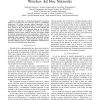Free Online Productivity Tools
i2Speak
i2Symbol
i2OCR
iTex2Img
iWeb2Print
iWeb2Shot
i2Type
iPdf2Split
iPdf2Merge
i2Bopomofo
i2Arabic
i2Style
i2Image
i2PDF
iLatex2Rtf
Sci2ools
117
Voted
ICC
2007
IEEE
2007
IEEE
On the Risk-Based Operation of Mobile Attacks in Wireless Ad Hoc Networks
—In this paper we study the propagation of malicious software in wireless ad hoc networks under a probabilistic framework. We design topology control algorithms for the development of effective attack strategies by a malicious mobile node, based on the risk function metric, which indicates the network’s vulnerability. Our approach takes on the attacker’s perspective, in order to investigate the extent of its attack potentials, which in turn could be used for the effective design of network countermeasures. Our performance evaluation results demonstrate that the proposed risk-based topology control algorithms and respective attack strategies effectively balance the tradeoffs between the potential network damage and the attacker’s lifetime, and as a result significantly outperform any other flat and threshold-based approaches.
Attack Strategies | Communications | Effective Attack Strategies | ICC 2007 | Topology Control Algorithms |
Related Content
| Added | 02 Jun 2010 |
| Updated | 02 Jun 2010 |
| Type | Conference |
| Year | 2007 |
| Where | ICC |
| Authors | Vasileios Karyotis, Symeon Papavassiliou, Mary Grammatikou |
Comments (0)

